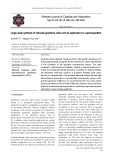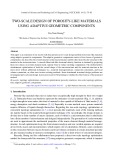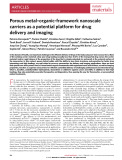
Porosity structures
-
Graphene-based electrode materials exhibit a high specific capacitance and long charge-discharge cycling life, but the material cost remains high because of the complexity of the graphene manufacturing process. This study employed an electrochemical exfoliation method to prepare graphene in a simple and ecologically friendly procedure. According to research findings, the disordered multi-layer structure of graphene exhibited great purity, porosity, and graphitization.
 6p
6p  vikwong
vikwong
 29-09-2024
29-09-2024
 2
2
 1
1
 Download
Download
-
This paper is an extension of our recent work that presents a two-scale design method of porosity-like materials using adaptive geometric components. The adaptive geometric components consist of two classes of geometric components: one describes the overall structure at the macrostructure and the other describes the structure of the material at the microstructures.
 9p
9p  vifilm
vifilm
 24-09-2024
24-09-2024
 3
3
 1
1
 Download
Download
-
Identification of fracture zone is a challenging task without the image log data. There are many brownfields around the world where the image log has not been acquired; therefore, there must be an alternative way of fracture identification. In this paper, a conventional log response technique for fracture delineation has been discussed. The study area lies in the Upper Indus Basin of Pakistan, which is sub-divided into the Kohat and Potwar basins. Minwal-X-1 of Joya Mair area, which lies in the Potwar Basin, is selected for this purpose.
 15p
15p  tanmocphong
tanmocphong
 29-01-2022
29-01-2022
 36
36
 1
1
 Download
Download
-
Porous metal organic framework nanoscale carriers as a potential platform for drug delivery and imaging, In the domain of health, one important challenge is the efficient delivery of drugs in the body using non-toxic nanocarriers. Most of the existing carrier materials show poor drug loading and or rapid release of the proportion of the drug that is simply adsorbed at the external surface of the nanocarrier.
 7p
7p  hotrotaitailieu
hotrotaitailieu
 30-03-2016
30-03-2016
 74
74
 1
1
 Download
Download
-
Porous hydroxyapatite ceramic was synthesized by solid phase method using Ca(OH)2 and Ca3(PO4)2 at the temperature interval 200 - 350o C. The samples, after pelleting and sintering, were characterized by X-ray diffractometry (XRD), Fourier transform infra-red spectroscopy (FTIR), scanning electron microscopy (SEM) and thermal gravimetric analysis (TGA). Porous structure of hydroxyapatite was obtained with the 42 – 55% porosity.
 5p
5p  uocvong01
uocvong01
 24-09-2015
24-09-2015
 117
117
 17
17
 Download
Download















